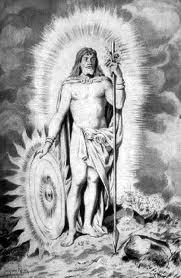Balder is the Norse god of light, and fulfills the universal spiritual role of the Sun God form for the Norse pantheon, i.e., the conception of a much-loved and renowned divine being who is killed and resurrected. This is a role fulfilled by Osiris in the Egyptian/Kemetic pantheon, and Jesus Christ in the Christian theological foundation. In fact, when Christian scholars of Nordic descent re-recorded the Norse myths for cultural posterity following the Christian ousting of Paganism in the Northern world, they readily interpreted Balder largely as a Christ-like figure in regards to what he meant to the Norse pantheon of deities and those who worshipped him in times past.
Said to be the offspring of Odin and Frigga, Balder is the most beloved, kind, and virtuous of all the deities, and as such virtually all beings in all the Nine Worlds revered him - except, of course, for the envious god of mischief, Loki. Determined to insure that Balder would never come to any harm, Frigga--the queen of the deities and a surpassingly powerful enchantress - used her magickal skills to make Balder immune to harm from all known weapons or substances throughout the Nine Worlds of the Norse cosmology. The sole exception to this (for reasons that vary in the tellings) was mistletoe, which was the light god's sole vulnerability following this extensive enchantment. It was also considered important for Frigga to use her great magickal rapport with all aspects of nature to immunize Balder against harm because it was foretold that his demise would be one of the combined factors that precipitated the coming of Ragnarok, the cataclysmic destruction of the Nine Worlds following a final titanic battle between the deities and all of their enemies.
Of course, no sooner did Loki find out about all of this, including Balder's sole vulnerability, that he set a dark plan in motion to trick the blind god Hoder into using his archery skills to strike Balder with an arrow composed of mistletoe wood. Balder was killed, and his spirit descended into the Norse underworld, where he fell under the jurisdiction of the death goddess Hela. Odin sent the deities' courageous messenger god Hermod on a solo journey to the underworld for the purpose of petitioning for Balder's return to the land of the living. Hela agreed on one condition: that every living being in all the Nine Worlds would shed tears over the light god's passing. When this caveat was made universally known, all beings did indeed shed tears...save for a single old woman who was actually Loki morphed into one of his many guises. Because this one being amongst countless others refused to shed tears, Balder's soul had to remain in the underworld for the time being. However, his eventual resurrection was likewise foretold, for with the resolution of Ragnarok and the establishment of a new cosmological order in its cosmic aftermath, Balder would rise from the underworld to lead the new race of Asgardians alongside his gentle wife, Nanna.
I have long had a strong spiritual affinity for Balder, as he is not only studiously wise with the advice he gives his mortal followers via their subconscious, but he never fails to manifest his presence when one is in emotional need for comfort. His presence has a powerful soothing effect upon one's state of mind when they are suffering from emotional turmoil. Further, he represents the promise of resurrection and rebirth, not merely the granting of a second chance but a potentially endless succession of chances to succeed in one's spiritual goals. His story also makes known the idea that death is not truly the end but simply a new beginning. His holy power of light is a refreshing force to be exposed to, as it gives one spiritual clarity and paves the way for a stronger connection between not only his followers and the deities, but also with the greater forces of the universe. Balder also serves as the Norse pantheon's official version of the pervasive Jungian archetype of the Great Martyr, thereby displaying yet another commonality with Christ of the Christian theology.
It can be surmised that if Ragnarok has not already occurred, Balder may have found his way back into the world of the 'living' under his own power, as the afterlife realm of Helheim/Hel is hardly a suitable resting place for the spirit of such a noble being.



